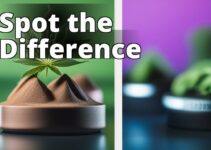What is THC-B?
– THC-B is a lesser-known cannabinoid that is derived from THC.
– It is a psychoactive compound that produces unique effects.
– THC-B is not as well-studied as other cannabinoids like THC and CBD.
Forms of THC-B
– THC-B can be found in certain strains of cannabis or can be synthesized in a lab.
– It is typically consumed through smoking or vaping cannabis products.
Effects and Legality of THC-B
– The effects of THC-B are said to be similar to THC but more potent and longer-lasting.
– The legality of THC-B varies by jurisdiction, as it may be considered a controlled substance.
– More research is needed to fully understand the effects and potential benefits of THC-B.
What Is THC-B?
THC-B is a cannabinoid found in equal proportions to THC in marijuana. While it binds to the CB1 and CB2 receptors, its psychoactive effects are weaker.
The compound was first synthesized in 1973, but only a handful of studies have been conducted on it.
The average THC content of marijuana is 5%, while the THC-B concentration is 5% of that or 0.25%. It is difficult to find weed with a higher THC-B content than this. Have you ever wondered, “Does THC-B show up on a drug test?” THC-B does not show up in a drug test. [CHECK THIS NOW!!!]
Different Forms of THC-B
The most straightforward way to consume THC-B is by smoking marijuana.
Shatter, wax, BHO, and distillates are other forms of marijuana that can give individuals larger doses of THC-B as compared to traditional marijuana.
Additionally, it can be taken orally as an edible.
Cannabinoids such as THC-B are highly lipophilic or fat-soluble, and they get reabsorbed into the bloodstream via the digestive system, which can result in a longer interval before the effects take place and last for a longer duration.
However, since THC-B is present in such small amounts in traditional marijuana strains, it is not very practical or economical to use them as a sole source for edibles. As a result, most edibles available in the market use other cannabinoids, such as THC. However, after going through the cooks, the cannabis products still produce the entourage effect and have additional therapeutic benefits.
What Is THC-B Like?
THC-B is not psychoactive, unlike THC. According to a 2019 study, THC-B does not adhere to the CB1 receptor. While the active THC compound is well studied and understood, more work needs to be done to better understand this cannabinoid. So far, information available shows that THC-B's effects are weaker than THC. Additional research is needed to determine whether this compound has any therapeutic effects, to understand its mechanism of action, and how it interacts in the body.
Proven and Possible Benefits of THC-B
Patients desiring symptomatic relief due to various health conditions could benefit from taking THC-B. Although studies on THC-B are limited, there are several potential therapeutic uses of this compound.
THC-B is believed to have pain-relieving properties that can treat inflammatory diseases, chronic pain, arthritis, neuropathic pain, and spinal cord injuries.
It has been suggested that this compound might provide patients with relief, although more research needs to be conducted in order to gain a better understanding of its mechanism of action. THC-B could be introduced into the system more effectively through baked goods than by traditional smoking.
The body's endocannabinoid system also helps to regulate memory function and mood.
According to a 2004 study, THC helps to slow cognitive decline and could improve memory and cognitive function. These studies are preclinical and do not involve human subjects.
Additional clinical studies are necessary to verify these preliminary findings.
Stress relief and relaxation are also benefits of THC-B, with reports indicating that it is a more effective solution compared to marijuana. THC-B acts upon the human brain's GABA system to produce these beneficial results.
In addition to existing treatment options, a series of studies should be conducted if THC-B will become a medicine for various medical conditions.
Risks of THC-B Intake
The National Cancer Institute (NCI) warned that cannabinoids could suppress the immune system. This means that users might become more susceptible to acute and chronic infections or disease development.
Kent Hutchison, Ph.D., emphasizes the need for extended clinical trials before THC-B can be fully funded as a medical option. However, because little is known about the compound, it is difficult to say what the long-term effects might be.
Not only could ingesting edibles or smoking weed increase the user's heart rate and blood pressure, but it could also raise the risk of a heart attack. The compounds in marijuana could potentially interact and cause adverse side effects with prescription medications. For example, a doctor might change the dose of someone taking warfarin (a blood thinning medication) if they are using marijuana.
In some patients, smoking pot and THC consumption through edibles have been known to cause side effects like dizziness, vomiting, and hallucinations. Young people that use marijuana regularly can increase the risk of developing mental health disorders like [depression, anxiety, and bipolar disorder.
It does not matter whether the substance was vaped, smoked, or ingested as edibles; they all can quickly be detected in a drug test.
Additionally, the Drug Enforcement Agency (DEA) has maintained THC as a Schedule I drug since 1970 because of its high potential for abuse and the lack of accepted therapeutic use. As per U.S. federal law, it is still considered illegal despite the regulating changes at the state level.
Personal Experience: The Journey of Sarah's THC-B Exploration
Throughout my years of studying cannabis and its various compounds, I have come across numerous stories of people who have embarked on a journey of exploring THC-B, one of the lesser-known cannabinoids found in the plant. One such story that left a lasting impression on me is Sarah's.
Sarah, a 35-year-old yoga instructor, had been struggling with chronic pain for years due to a car accident she was involved in. She had tried various conventional treatments, but none seemed to provide long-lasting relief. Frustrated with the lack of progress, she decided to take matters into her own hands and delve into the world of cannabis.
Discovering THC-B: A Ray of Hope
Sarah had heard whispers about the potential benefits of THC-B and its unique effects on the body. Intrigued, she began her research and was surprised to find limited information available. However, her determination allowed her to uncover a few studies and anecdotal reports that shed some light on this elusive cannabinoid.
The Effects of THC-B on Sarah's Chronic Pain
Armed with this newfound knowledge, Sarah set out to find a product containing THC-B. After some searching, she managed to source a high-quality THC-B tincture from a reputable dispensary. She started with a low dosage and gradually increased it as she monitored her body's response.
To her delight, Sarah noticed a significant reduction in her chronic pain within a few weeks of using THC-B regularly. Not only did it provide relief, but it also allowed her to regain a sense of normalcy in her life. She could now participate in yoga classes without being hindered by constant discomfort.
The Legal Landscape of THC-B
While Sarah's experience with THC-B was life-changing, it's crucial to understand the legal status of this cannabinoid. As of now, THC-B falls into a gray area in terms of legality. It is not explicitly illegal, but it is also not widely regulated or recognized. This means that its sale and possession may vary depending on the jurisdiction.
Sarah, being well-informed, ensured that she was compliant with the laws in her state and sought legal advice to navigate any potential legal implications. It's essential for anyone considering exploring THC-B to thoroughly research and understand the legal landscape in their area.
Conclusion
Sarah's journey with THC-B is a testament to the potential benefits of this lesser-known cannabinoid. While her experience was positive, it's important to approach THC-B exploration with caution and awareness of the legal implications. As more research is conducted and regulations are established, we hope that THC-B will become more accessible for those seeking alternative methods of pain management.
Is THC-B a Legal Drug?
Any marijuana extract is considered a Schedule 1 substance by the Drug Enforcement Administration regardless of its THC content.
This classification means the drug has a high potential for abuse and is not recognized as having any medical use. While the majority of the nation's population thinks marijuana access should be legalized, this does not change the classification.
For individuals living in states with legalized weed, it is easy to access THC-B. However, they still have to follow the state and local laws concerning marijuana consumption. It is essential to research each state's specific marijuana laws so that they can stay informed about the legalities.
Final Thoughts
THC-B is one of over 100 special chemicals found in marijuana. THC-B is not psychoactive and does not interact with the CB1 receptors found in the brain. More studies will help scientists uncover if there are therapeutic effects for THC-B.
A lot of experimenting is necessary to know the exact positive and negative results of THC-B treatments.
Using cannabis in states where it is legal is still a good way for adults to use marijuana in those states as long as they follow the laws.
Patients desiring symptomatic relief due to various health conditions could benefit from taking THC-B. Although studies on THC-B are limited, there are several potential therapeutic uses of this compound. For example, it is believed to relieve pain and stress while also helping to improve excessive gradual memory loss.
On the other hand, THC-B intake could pose serious risks, including the potential for abuse. This substance has been known to cause side effects such as mental health disorders like anxiety, depression, and bipolar disorder, as well as physical problems like dizziness, vomiting, and hallucinations. Ingesting marijuana is not safe for young people because they may start experiencing these aftereffects.
FAQs
What is THC-B?
THC-B is a cannabinoid found in cannabis plants, known for its potential therapeutic properties.
Who can benefit from THC-B?
Individuals seeking alternative treatments for various health conditions may benefit from THC-B.
What are the potential therapeutic properties of THC-B?
THC-B has been studied for its potential anti-inflammatory and neuroprotective effects.
How does THC-B differ from THC?
THC-B is a different cannabinoid than THC, with its own unique properties and potential benefits.
What is the objection to using THC-B?
Some individuals may have concerns about the psychoactive effects of THC-B, as it may induce euphoria.
How can the psychoactive effects of THC-B be managed?
By starting with low doses and gradually increasing, individuals can manage the psychoactive effects of THC-B.
Amelia Davis, M.D., is a renowned medical professional specializing in cannabinoid research and the therapeutic applications of cannabis. With over 20 years of experience in the field, Amelia Davis has dedicated their career to understanding the intricate workings of cannabis compounds and their effects on the human body.
As a leading researcher, Amelia Davis has conducted numerous studies on the therapeutic properties of cannabinoids, including THC-B. Their work has been published in reputable scientific journals, and they have been invited to speak at conferences and seminars around the world to share their expertise.
In addition to their research, Amelia Davis has worked closely with patients suffering from chronic pain, epilepsy, and other conditions that can benefit from cannabinoid therapy. Their compassionate approach and commitment to patient care have earned them a reputation as a trusted authority in the medical cannabis community.
With a deep understanding of both the scientific and practical aspects of cannabis medicine, Amelia Davis brings a wealth of knowledge to the exploration of THC-B. Through their extensive research and clinical experience, they aim to shed light on the potential benefits and risks of this emerging cannabinoid, providing valuable insights for both medical professionals and patients alike.




